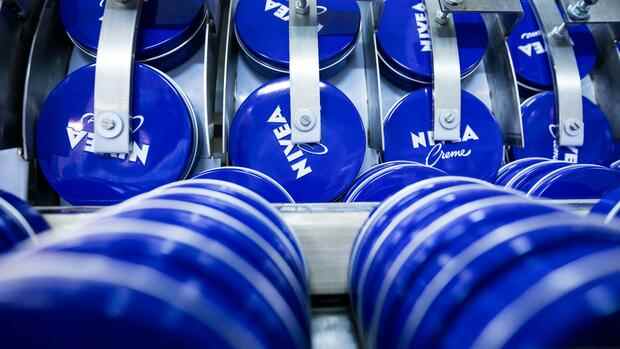Beiersdorf presented its quarterly figures on Thursday.
(Photo: dpa)
Dusseldorf Shortly before its return to the Dax, the Nivea manufacturer Beiersdorf presented good quarterly figures. In the first nine months, sales of the consumer goods manufacturer grew organically by twelve percent to 5.8 billion euros, as the company announced on Thursday morning.
As of Friday, Hamburg will again be listed in the first stock market league. The return has become possible because the real estate group Deutsche Wohnen has to vacate its space. Beiersdorf was relegated from the leading index in March after 14 years – and just missed the move back in September when the Dax was expanded to 40 companies.
The traditional group, which is majority owned by Maxinvest Holding owned by the Herz family, had suffered severely from the corona restrictions. In 2020, sales slumped by 5.7 percent to around seven billion euros, but in the first nine months of 2021, sales recovered significantly.
“Looking back over the past nine months, we have made significant progress in implementing our strategic priorities. This is also reflected in our good financial results, ”CEO Vincent Warnery was quoted as saying in a corporate statement.
Top jobs of the day
Find the best jobs now and
be notified by email.
Beiersdorf rests on two pillars: the Consumer Business Segment with the core brand Nivea and the adhesives division Tesa. The consumer division achieved organic sales growth of 10.4 percent in the first nine months. The turnover is 4.6 billion euros.
Core brand Nivea grows by 6.8 percent
The core brand Nivea, with which Beiersdorf generates a large part of its sales, is recovering somewhat more slowly from the pandemic: It recorded organic sales growth of 6.8 percent compared to the previous year. The main driver was the increasing demand for sun protection products, for example, which can be explained by the increasing travel activity.
The Group’s problem child, the luxury brand La Prairie, grew significantly in the past quarter: The 26.2 percent growth in sales in the first nine months is also based on increasing demand from China.
In the consumer area, Beiersdorf recorded strong growth of 38 percent in e-commerce across all brands and regions. The Hamburg-based company is accelerating its efforts in online business after having relied on brick-and-mortar retail for a long time. For industry observers, Beiersdorf was not as advanced as the competition in the online business for many years.
Martina Becker, consumer goods and retail expert at Atreus, says that the high growth rates can also be explained by a pandemic-related weak previous year. “How quickly Beiersdorf can actually pick up the speed in digital transformation across all business areas will be shown in a year at the latest.”
Tesa benefits from the automotive and electrical industries
The Beiersdorf subsidiary Tesa has benefited from increasing demand, especially from the automotive and electrical industries. In addition to adhesives for home use, Tesa is developing heat-conducting tapes for smartphones and fireproof adhesive tapes for electric cars. Sales at Tesa rose by 18.4 percent to 1.2 billion euros in the first nine months compared to the same period in the previous year.
Beiersdorf, which employs more than 20,000 people, is assuming organic sales growth of between eight and ten percent for the entire fiscal year. Analysts also expect growth of this magnitude.
Thomas Hofmann from the Landesbank Baden-Württemberg (LBBW) expects that Beiersdorf will continue to grow faster than the competition in the future. The strategic alignment of the Hamburg-based company with core measures such as digitization, a focus on skin care and the development of growth markets will help.
Last year, the share price fell by almost four percent, with strong fluctuations. A share certificate last cost around 97 euros. The average price target of analysts over a period of one year is 105 euros.
Unrest in the management level
At the management level, there has recently been unrest among the Hamburgers. Within a few months, three out of six board members were replaced. The departure of CEO Stefan De Loecker at the end of April after only two years in office was surprising. The French Warnery took his position. The position of Chief Marketing Officer is still vacant, but should be filled in the coming weeks.
More: Beiersdorf returns to the Dax – what that means for investors
